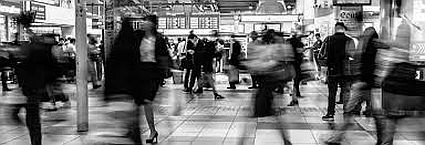For my entire career, “we” are addicted to busyness. We seem to measure our worth by how we fill our calendars and that pleasant feeling of exhaustion at 10PM when we have finished a busy day. We revel in our ability to multitask, even though the data shows that multitasking makes us accomplish less. We derive great pleasure in looking at our calendars, seeing every minute packed with some sort of activity. And we feel we have accomplished huge amounts with each to-do, task, meeting we check off as complete.
We can’t resist the skipping between multiple windows or apps on our computers, though the research shows how adversely it impacts our productivity. On Zoom calls, I’m astounded as a person shares their screen and I see the dozens of applications/windows open on that device. In meetings, our eyes are diverted by the notices coming into our phones or even on our watches. Our attention wanders from the meeting to those alerts.
Some years ago, I was consulting with a very large industrial products company. After lunch in the cafeteria, I was in an elevator going to the office the client had provided me. As I jumped in, I saw the CEO. I reintroduced myself, we exchanged pleasantries. Then he paused. “Dave, my team isn’t as productive as I need them to be. I’m not sure I’m as productive as I should be. What should I do?”
I rode with him to the 19th floor and we walked past the desks of several executive assistants and a chief of staff. We went into his office, I asked him to show me his calendar. He rolled his eyes, “Dave, I had hoped you might give me more than time management advice…..”
But as we looked at his calendar, we saw the classic back to back meetings from early in the morning into early evening, every day. There was something else, he was in the habit of scheduling several meetings simultaneously. They would be in conference rooms next to his office and he would hop back and forth between those meetings. When I questioned him about that, his reply, “I have a lot to do, this is the only way I can get my work done.”
We then looked at the calendars of his direct reports–the COO, CFO, CRO, Division GMs, and so forth. Each of them had copied his behavior, they were scheduling themselves in back to back simultaneous meetings. And we randomly looked at a number of their direct reports and down several layers. We saw the same patterns.
I asked, “With everyone hopping between all these meetings, how does anyone ever accomplish anything?” He finally got what I was talking about. He could see how the busyness and constant meeting mulitasking was keeping them busy, but adversely impacting productivity. “What do I do,” he asked. We focused, first, on scheduling one meeting at a time. “Which one’s do I cancel,” he asked. “It doesn’t matter, the important one’s will emerge…” I responded. In a relatively short time, he could see the organization accomplishing more, though it was “less busy.” There were other things we talked about, but I’ll stop here.
Today, we are leveraging technology more and more. It offers us the potential of making us more efficient, but we are finding it making us less effective. We see declining results, whether it is people making quota, win rates, deal sizes, customer engagement.
But our addiction to busyness drives the wrong response. Rather than figuring out why these things are happening, our reaction is to do more. So we ramp of volumes–more emails, more social engagement, more calls, more demos, more meetings, more of everything.
We get that endorphin rush from our busyness, we brag to colleagues about how much we have accomplished in the day, but our results continue to decline.
And this lead to burnout, exhaustion, dissatisfaction. We are incredibly busy, yet we aren’t accomplishing anything. We move from job to job, hoping to find something that allows us to be more successful. We develop new programs or initiatives, we implement AI and other new technologies that enable us to pack more into our work hours.
Busyness is a bad indicator of what we produce in Business. And we have too much data supporting this, yet we still focus on activity, not outcomes.
I have to constantly remind myself or be reminded that I suffer from the same addiction to busyness. As much as I try not to do these things, I fall victim to the false sense of accomplishment. Every night I have a conversation with my mother. She always asks, “How was your day?” I respond with how busy I was, all the meetings and activities I was engaged in. Then she asks, “Did you take time to go to the gym? Did you meditate? Did you go out for a walk? What did you read?” Subtly, she reminds me there are things more important than being busy.
I’m not telling you (or myself) anything new. There have been hundreds of books by renowned authors about this challenge. I listen to them while driving or working out, or they are playing in the background as I work (Hmmmmmm)
Addictions are tough to break. But we have to start.
“Hi, my name is Dave. I’m a workaholic/activity junky….”

Leave a Reply